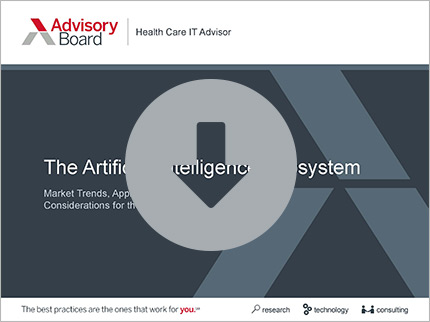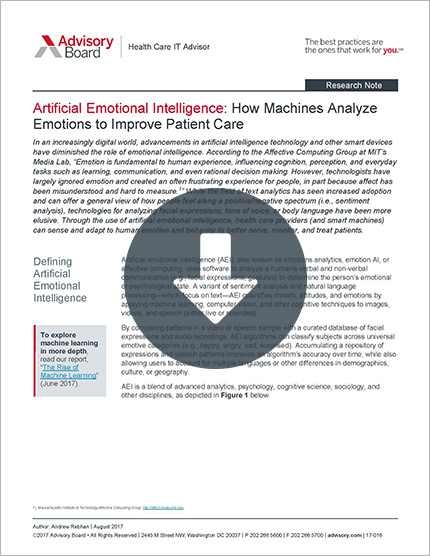Auto logout in seconds.
Continue LogoutIn February, three Memorial Sloan Kettering employees founded a for-profit venture aiming to revolutionize pathology—but some pathologists and legal experts argue that the company could benefit inappropriately from an exclusive deal to use materials in Sloan's archives, Charles Ornstein and Katie Thomas write for ProPublica and the New York Times.
Innovation 101: Cheat sheets for today's digital world
Details on the company
Pathology, Ornstein and Thomas write, is "a time-consuming, error-prone and often subjective process" that relies on the doctor to examine, spot, and identify cancer on tissue slides. The new company, called Paige.AI, aims to use artificial intelligence to improve that process and give providers a "second opinion," venture capitalist Jim Breyer said at a New York Times conference in February.
The company is one of many working to improve pathology, but Ornstein and Thomas write that Paige.AI has a key advantage: It struck an exclusive deal with Memorial Sloan Kettering to use the center's archive of 25 million patient tissue slides, as well as decades of research by the center's pathologists.
While Ornstein and Thomas write that it's not uncommon for universities and hospitals to monetize their scientific discoveries, the Paige.AI deal stands out "because what's being commercialized is not an invention, per se, but rather access to raw materials—notes and slides—gathered over decades."
Another complicating factor, Ornstein and Thomas write, is the close financial ties between Paige.AI and Memorial Sloan Kettering insiders. Norman Selby, a member of the Sloan Kettering's board's executive committee; David Klimstra, chair of the hospital's pathology department; Thomas Fuchs, the head of the computational pathology laboratory; and Memorial Sloan Kettering, all have equity stakes in Paige.AI. According to Ornstein and Thomas, three other board members invested in the company, which officials said struggled to find outside investors.
Richard Beattie, honorary chair of Sloan's board and a member of its executive committee, said all four Sloan board members who are invested in Paige must recuse themselves from any board actions related to the company.
Controversy surrounding the company
Several pathologists at Sloan raised concerns about the relationship between the cancer center and Paige—and their lack of input in the process. They said they did not learn about the deal until after it closed and said it was unfair the founders of the company could profit from a company that relies so heavily on the expertise of pathologists at Sloan, Ornstein and Thomas write.
October 17 webconference
Health Care IT 101Some doctors also expressed concern about whether using patients' data, even anonymized data, without their consent in a for-profit company was ethical.
Klimstra said the project had been reviewed by an institutional review board and that all patients who had not given their consent to have their tissue samples shared would have all of their personal health information removed from both the images and notes.
Some law experts have also raised questions about whether Sloan had complied with federal and state law in its dealings with Paige. Marcus Owens, a Washington lawyer who formerly ran a division of the Internal Revenue Service that handles tax-exempt organizations, said it seemed "awfully coincidental that the individuals involved [with the creation of Paige] happen to be people in control and influence of that asset, and they ended up with an exclusive use of it."
Nonprofit groups are allowed to make deals with companies associated with board members or employees, but under federal law, they must demonstrate that those insiders won't get preferential treatment. If they do, the nonprofit or individuals involved could face tax repercussions.
According to Beattie, the value of licensing the slides was determined by investors with help from hedge fund leaders on the board. Those documents were reviewed and signed off by an unidentified law firm, Beattie said.
However, Nell Minow, the vice chair of ValueEdge Advisors, said Sloan's process was "inadequate," saying Sloan "could be throwing a dart at the wall to figure out what the valuation is. They're accepting somebody's word for it and that's very, very risky."
Response
Hospital officials acknowledged some missteps in communicating the startup to internal workers.
Kathryn Martin, Sloan's COO, said the cancer center had not anticipated objections from its pathologists. "I think we could have done a better job communicating it," she said.
Klimstra, who has said he plans to divest his ownership stake in Paige.AI said, "Other than my family, there is nothing more important to me than running my department." He added, "I sincerely regret the fact that my equity ownership in Paige has served as a distraction to my primary leadership role at [Sloan]."
However, Gregory Raskin, the hospital's VP of technology development, in an interview, defended the company and its investors. "This is an incredibly expensive undertaking—it needs a lot of money." He added, "We feel this is a really valuable and important technology to get developed" (Ornstein/Thomas, New York Times/ProPublica, 9/20).
Cheat sheets: Understand AI, Cybersecurity, and more
Download our cheat sheets so you can keep track of the fast-changing technologies and capitalize on opportunities for IT-powered innovation. Check out our guides for these topics and more:
Don't miss out on the latest Advisory Board insights
Create your free account to access 1 resource, including the latest research and webinars.
Want access without creating an account?
You have 1 free members-only resource remaining this month.
1 free members-only resources remaining
1 free members-only resources remaining
You've reached your limit of free insights
Become a member to access all of Advisory Board's resources, events, and experts
Never miss out on the latest innovative health care content tailored to you.
Benefits include:
You've reached your limit of free insights
Become a member to access all of Advisory Board's resources, events, and experts
Never miss out on the latest innovative health care content tailored to you.
Benefits include:
This content is available through your Curated Research partnership with Advisory Board. Click on ‘view this resource’ to read the full piece
Email ask@advisory.com to learn more
Click on ‘Become a Member’ to learn about the benefits of a Full-Access partnership with Advisory Board
Never miss out on the latest innovative health care content tailored to you.
Benefits Include:
This is for members only. Learn more.
Click on ‘Become a Member’ to learn about the benefits of a Full-Access partnership with Advisory Board
Never miss out on the latest innovative health care content tailored to you.


